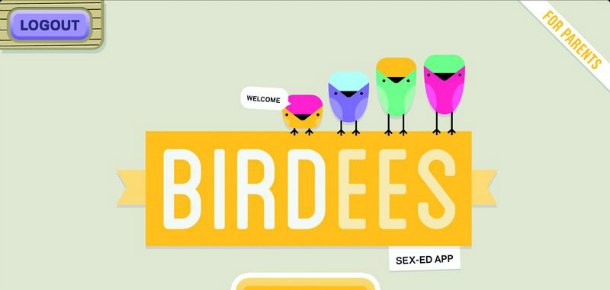Jennifer Weidemann, co-founder of GoTo Educational Technology, said, “Sex education can be intimidating for parents, even something they avoid for fear they would get it wrong. Our goal was to give them a resource that was light, fun and informative, where both the parent and child could learn in a stress free environment.”
This line of thought is what led to the creation of Birdees.
Designed to keep children of all ages engaged and learning, children meet various characters along the way like Archie the Owl who acts as their guide throughout. Like most modern video games, there are achievements and trophies to be unlocked as the child progresses through the material. Content is customizable depending on the age level of the child. Modules for ages two to eight are already available, but additional modules for ages 9 to 15+ are already being developed.
GoTo Educational Technology co-founder Mary Roka said, “We’ve collaborated with some of the best sex educators in the field to ensure the content is accurate, up to date and as comprehensive as possible. We’ve left no stone unturned!”
Birdees offers guided lesson and coaching so that the conversation can be as self-directed as the parent/user needs. Topics cover basic anatomy, sex, and more sensitive topics like sexual predators.

The Birdees app explains things as complicated as sexual predators in a simple way that children can understand.
According to GoTo, predators are less likely to target children with body awareness and confidence. A well informed child who communicates with their parents openly is more likely to report abuse or suspicious activity. So, in this case, knowledge is quite literally giving children the power to protect themselves.
Ultimately, Birdees’s goal is to promote health, respect, and safety; helping parents get an early start is probably for the best. As GoTo’s website states, “It’s easier to teach children when they are younger. These conversations don’t get easier with time, they get harder.”


My advice to parents: the very best thing you can do for your kid is to look within yourself and wrestle with the idea of “WHY do I feel fear, embarrassment, and awkwardness when I think about talking to my child about sex and human reproduction?” BEFORE you start talking with them about it.
Think about how you talk with them when you’re teaching them something else—say, how to fly a kite. You feel calm and comfortable talking to them about it, right? You’re happy that they’re going to learn about a joyous activity; you warn them how a strong wind can make the string rip through their hands and cause string burn, you warn them about keeping the kite away from power lines and traffic… but you don’t seize up with those warnings. Instead, they’re just the necessary cautions you need to deliver, and your main focus is on the fact that kite-flying is a human activity that brings a lot of enjoyment and happiness.
Now take all that, and apply it back to your talks about sex. As the teacher, you can inhibit, or give a healthy viewpoint—and at least some of that isn’t just what you say, but how you say it: your body language, expressions, and tone of voice as well as your word choices. Yes, sex is a serious subject—but it’s also a joy in life. Don’t lose that thought when you do your talking (which should be “talking” as in “may talk many times, some may be in-depth while others may be a single question and answer—not “THE (one and only) TALK”).
Also, try to avoid “lecture hall” mode (that one’s my biggest downfall, lol). Instead, give a bit of information, then pause to see if they have questions, and really listen to their questions and thoughts. If you’re afraid you’ll forget something important because the conversation got diverted into what they are asking about, then make a brief checklist beforehand, so you can use that to go back and hit the other important points after the side-track, or even later in another conversation.
Finally, if your kid’s body-language or comments show discomfort, don’t ignore it—address it. Ask them calmly but with a smile and faith in them and the air of “It’s okay, you can tell me about this”. Be point blank and say “You seem uncomfortable talking about this—that’s okay, but can you tell me why?” They may or may not be able to find the right words, but accepting their discomfort can help reassure them. Also, if they’d rather talk with the other parent or someone else instead of you, support that also.
Oh, also, be willing to recognize when your kid has hit a “saturation point” in the conversation, and leave anything else for another time.
My own kids ranged from “very comfortable, willing to ask anything” to “certain level of discomfort, hits saturation point easily”, depending on the kid in question. With the latter, I tried (and try) to respect that. With the former, on rare occasion the questions got a little too close to personal (as in not speaking about general situations but getting into aspects of what I’ve done that are personal and inappropriate to share). When that happened, I gently stated that without censure, and it went fine from there.
You see children, the Daddy’s flash drive combines with Mommy’s USB port and that’s how iPad minis are made.
I get nervous about the sample screen being about sexual exploitation. I’m not saying that this discussion doesn’t belong in a comprehensive sexual education product — only a concern that this is somehow the overarching theme of the entire product. To me you should learn about the reasons, motivations and rewards of healthy sexual contact before it happens to come up that some people break the rules. Nevertheless, something designed to foster communication is probably a good thing — which is as much as I can say without grabbing a copy.